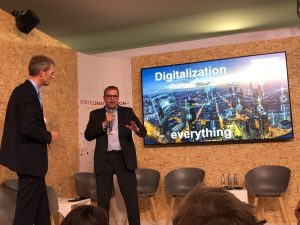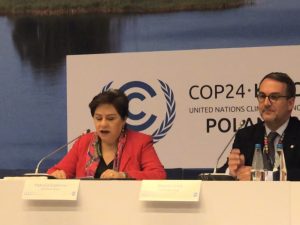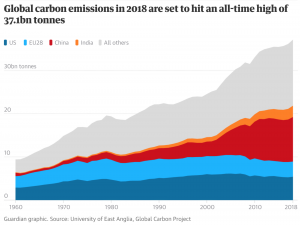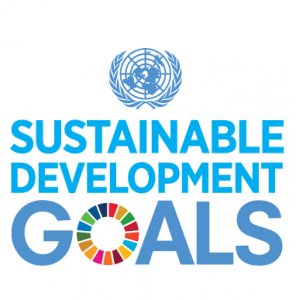 During the entirety of week 2 at the COP, I started off my day by attending the BINGO constituency (Business and Industry Non-Governmental Organizations) meeting. These meetings were a great way to nail down the side events of interest happening that day. At the COP, because it is such a large conference with representatives from around the world, the sheer number of events can be overwhelming to navigate. A strategy I’ve learned is to make a rough outline (emphasis on rough since so many side events are not announced on the Daily Programme, so leaving flexibility to change your plan for the day is also important) the night prior, though these programmes aren’t released until late.
During the entirety of week 2 at the COP, I started off my day by attending the BINGO constituency (Business and Industry Non-Governmental Organizations) meeting. These meetings were a great way to nail down the side events of interest happening that day. At the COP, because it is such a large conference with representatives from around the world, the sheer number of events can be overwhelming to navigate. A strategy I’ve learned is to make a rough outline (emphasis on rough since so many side events are not announced on the Daily Programme, so leaving flexibility to change your plan for the day is also important) the night prior, though these programmes aren’t released until late.
On the second day of week 2, I mainly attended negotiations with a cities event in between. That morning I successfully scored a ticket to the Second-Half of the High-Level Segment at the BINGO meeting! My day started by attending the Talanoa Dialogue (find my post on the closing session of this year’s Ministerial Talanoa here), created at COP23 (Conference of Parties #23, hosted last year in Bonn, Germany, by Fiji) was a wonderful addition to the annual UN climate change conference as it created a separate space for inclusive dialogue. Talanoa in Fijian means “a process of inclusive, participatory, and transparent dialogue”, which I truly believe in as a great way to increase the degree of trust between parties. Trust is an essential part of the enactment of the Paris Agreement because under Nationally-Determined Contributions (NDCs), countries make their own commitments to climate action. Trust is essential to avoid a global collective action problem, and essential to this year’s negotiations.
 It was a combination of my interest in renewable energy, my love of vertical, dense cities coupled with the need for systemic change in city-planning practices (particularly transportation, and buildings) that drove me to attend the Smart Cities event. At the event, four esteemed panellists (representatives from Volkswagen, Robert Bosch GmbH, thyssenkrupp AG, and ICLEI) discussed the future of cities; what they believed is needed to minimize carbon emissions of future growth, and manage existing city infrastructure. ICLEI is one of my favourite organisations because of their work in the Public-Private Partnership (PPP) space, and their leveraging of multilateral linkages and connections to catalyse sub-national sustainable urban development. The panellists echoed the key barriers of smart cities: the high capital costs of infrastructural change, and difficulty in transforming existing (read: less efficient) buildings.
It was a combination of my interest in renewable energy, my love of vertical, dense cities coupled with the need for systemic change in city-planning practices (particularly transportation, and buildings) that drove me to attend the Smart Cities event. At the event, four esteemed panellists (representatives from Volkswagen, Robert Bosch GmbH, thyssenkrupp AG, and ICLEI) discussed the future of cities; what they believed is needed to minimize carbon emissions of future growth, and manage existing city infrastructure. ICLEI is one of my favourite organisations because of their work in the Public-Private Partnership (PPP) space, and their leveraging of multilateral linkages and connections to catalyse sub-national sustainable urban development. The panellists echoed the key barriers of smart cities: the high capital costs of infrastructural change, and difficulty in transforming existing (read: less efficient) buildings.
 The highlight of my day (yet again) was having the honour of listening to Patricia Espinosa, Executive Secretary of the UNFCCC, speak at after the COP24 President, Michał Kurtyka, introduced the Second-Half of the High-Level Segment. After the formal introduction, ministers and prime ministers of all parties went up one by one to give their national statements. With only three official days of COP24 left, the pressure to complete the Rulebook is on. While most parties recognized the urgency and necessity of the finalisation of the Paris Rulebook, some countries refused to “welcome” the IPCC Special Report on 1.5oC (not trying to point fingers, but they were the US, Kuwait, Saudi Arabia, and Russia). As a matter of fact, the US event went as far as to host an official side event on “green coal” and “sustainable fossil fuels”. Working for the BCSE was particularly interesting as they are very much entangled and in tune with the US delegation at the COP, navigating the politics at play in the US and at the COP, while their members (BCSE has 50+ members, comprised of companies in the renewable energy sector) ‘watched’ from reading the BCSE’s daily updates.
The highlight of my day (yet again) was having the honour of listening to Patricia Espinosa, Executive Secretary of the UNFCCC, speak at after the COP24 President, Michał Kurtyka, introduced the Second-Half of the High-Level Segment. After the formal introduction, ministers and prime ministers of all parties went up one by one to give their national statements. With only three official days of COP24 left, the pressure to complete the Rulebook is on. While most parties recognized the urgency and necessity of the finalisation of the Paris Rulebook, some countries refused to “welcome” the IPCC Special Report on 1.5oC (not trying to point fingers, but they were the US, Kuwait, Saudi Arabia, and Russia). As a matter of fact, the US event went as far as to host an official side event on “green coal” and “sustainable fossil fuels”. Working for the BCSE was particularly interesting as they are very much entangled and in tune with the US delegation at the COP, navigating the politics at play in the US and at the COP, while their members (BCSE has 50+ members, comprised of companies in the renewable energy sector) ‘watched’ from reading the BCSE’s daily updates.




